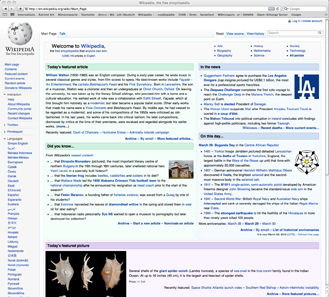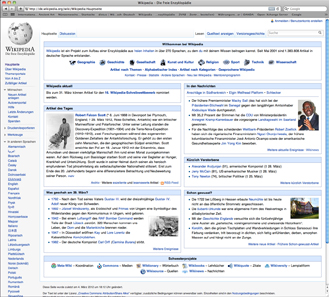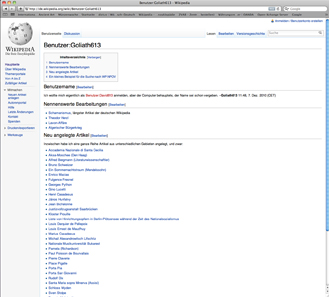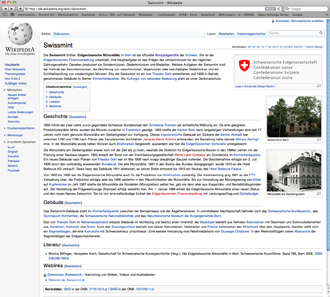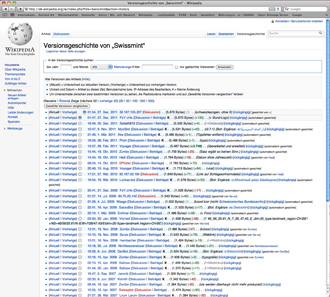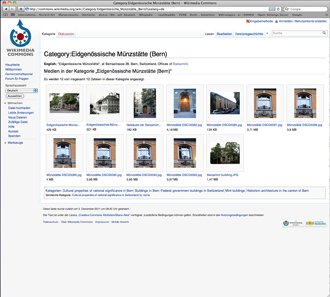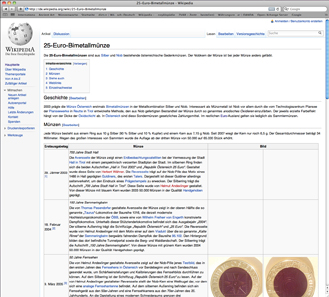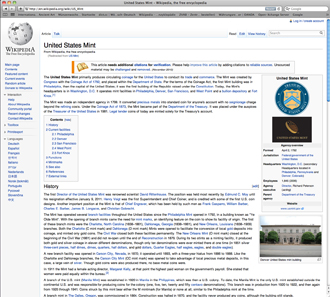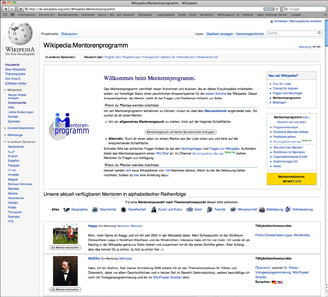by Marcus Cyron
The online encyclopedia Wikipedia has been around for approximately eleven years, and while it was initially simply intended to support another online encyclopedia project, its authors soon developed it into one of the most successful online projects of all time – something that surprised even to the Wikipedia co-founders Jimbo Wales and Larry Sanger. Wikipedia is also one of the most unusual knowledge projects in the history of humankind.
http://en.wikipedia.org/wiki/Main_Page
The English-language Wikipedia managed to reach the magical threshold of 100,000 articles in only three years – five years less than even Wales’ most optimistic estimate. Despite numerous problems and setbacks, Wikipedia not only managed to continue its previously inconceivable success, but even accelerated its growth over an extended period. Wikipedia is now available in more than 280 languages and comprises a total of about 21 million articles. With almost four million articles, the English version, which also acts as a kind of informal core project, is the largest; followed by the German version with around 1.4 million articles.
http://de.wikipedia.org/wiki/Wikipedia:Hauptseite
“German” Wikipedia
The “German Wikipedia” is widely regarded as one of the best-quality language versions. Various tests including one conducted by the German news magazine Stern in December 2007 agreed that Wikipedia is, at the very least, not any worse than well-known print encyclopedias. At the same time Wikipedia offers an advantage that gives it increasingly more leverage: in contrast to hardcopy reference works, it can be continuously corrected, updated and improved. Even mischievously deployed misrepresentations usually do not last for more than a few minutes. Cases such as the “Guttenberg incident”, which gained notoriety well beyond inner Wikipedia circles, are an exception: the former German minister of defence, who has the impressive number of ten given names, was incorrectly given yet another one, the very Prussian “Wilhelm” of all things, which was rather unlikely, given that he comes from a long line of Franconian nobility from southern Germany.
http://de.wikipedia.org/wiki/Benutzer:Goliath613
How to contribute an article
It is quite easy to participate actively in Wikipedia, as it operates on the general principle that good authors are always welcome. Everybody can contribute to this “encyclopedia creation project”, at least in theory. Registration is not a fundamental requirement – so-called “IP” texts can be authored by anyone – but only registered authors are given their own discussion page and are able to establish a reputation. Additionally, articles contributed under a registered user name provide more privacy than IP contributions, as articles by unregistered users are permanently saved with the author’s IP address rather than the user name.
http://de.wikipedia.org/wiki/Swissmint
One of the best features of Wikipedia is the easy creation of links between articles. References to existing articles are shown in blue, while red references indicate that the relevant articles have not yet been authored. Many new authors start by identifying such red links and contributing the associated article. Clicking on a red link opens an editing window where the article text can be entered.
http://de.wikipedia.org/w/index.php?title=Swissmint&action=history
Basic principles
New authors are generally given quite a bit of leeway if they are not yet familiar with the internally used syntax, such as double square brackets ([[reference]]) for references to other articles, but Wikipedia contributors usually learn these details quickly. The following basic principles need to be observed at all times, though:
- Wikipedia is an encyclopedia, or an encyclopedia under construction: it is not a telephone directory, nor a kind of yellow pages or an advertising platform.
- Neutrality: a neutral perspective attempts to portray ideas in a manner that is acceptable to both proponents and detractors. It does not need to meet everybody’s approval, which would be unrealistic anyway, as some ideologies reject any positions outside their own. The goal should therefore be to develop descriptions that are acceptable to all rationally thinking readers. Also, Wikipedia articles do not evaluate, and authors do not present their own research in their articles. They rather describe the current state of scientific research as accurately as possible in any given case. Minority opinions may be presented, but this should be in keeping with their significance. Wikipedia is not a place to correct real or perceived injustices in the world.
- Free content: Wikipedia is a free encyclopedia, and its contents must be subject to free licences. Wikipedia texts are subject to the Creative Commons licence Attribution-ShareAlike 3.0 Unported, which permits commercial use and editing, provided that authors are credited and that any further distribution remains subject to the same conditions (copyleft). Images are subject to various licences. Contrary to the common misunderstanding that Wikipedia is called “the free encyclopedia” because everybody can contribute whatever they like, the “free” in fact refers to these licensing aspects: as long as licensing conditions are complied with, Wikipedia texts may be used freely.
- “Wikiquette”: Wikipedia authors are expected to treat each other with the same respect that would apply to any other form of interpersonal contact.
- Additionally all information contained in articles should be referenced appropriately. Using external references, above all specialist literature, but also websites and other resources, has been mandatory for German Wikipedia pages for several years. Distributing private opinions via Wikipedia therefore not only breaches its basic principle of neutrality, but also fails the requirement for appropriate referencing. References can be provided through individual footnotes, bibliographies or references to other websites.
http://commons.wikimedia.org/wiki/Category:Eidgenössische_Münzstätte_(Bern)?uselang=de
Image rights
There are several reasons why image rights present a particular problem in Wikipedia: unlike text rights, image rights are not governed by a uniform set of rules, and free image licences can take several possible forms. The most common image licences are Creative Commons (CC) and Public Domain (PD) licences. While the latter frequently permits largely free subsequent use of materials, CC licences require the creator and the licence to be credited. Many photographers accept a mention of Wikipedia, even though this is not strictly correct procedure, or a mention of the central data pool Wikimedia Commons, which is more appropriate, as this at least indicates the intent to apply proper licensing procedures to subsequent use.
http://de.wikipedia.org/wiki/25-Euro-Bimetallmünze
Where authors produce photographs themselves, the choice of the appropriate licence is often quite straightforward. With a CC licence all rights are retained, but unrestricted subsequent use is permitted. Publication under a PD licence means that all rights become public. However, some restrictions still need to be kept in mind, as image rights are a highly complex matter: when photographing in a museum, for example, photographers need to consider whether they are permitted to take photographs in the first place, and if so, whether they may then also publish their photographs. This would be the case where the creator of a work of art has been dead for at least 70 years, as works then become part of the public domain, like reproductions. Authors also need to consider whether other personal rights may possibly be breached.
Authors wishing to contribute images should be aware that such images need to be – and will continue to be – under the same free licence as any other contributions to Wikipedia. By making their images available, authors expressly agree to the subsequent use of these images. In relation to coins, for example, which are official works anyway, it is unlikely that any objection could be raised to the publication of their images in Wikipedia, but regarding other items such as medals authors always need to keep in mind that images may be reproduced again elsewhere.
http://en.wikipedia.org/wiki/US_Mint
Authors’ own voices and neutrality
What about authors presenting their own perspective in Wikipedia, for example in the case of employees of mints contributing articles? Generally there is no rule prohibiting the presentation of individual perspectives. Some Wikipedia employees do not like it, though, especially when it is not made clear whether the author’s user name hides an “official” representative of the article’s subject matter. It is always preferable to deal openly with one’s identity as a representative of a company or institution.
http://de.wikipedia.org/wiki/Wikipedia:Mentorenprogramm
In Wikipedia, support is available from many sources, including mentors, who can be nominated upon request to provide assistance in the early stages of contributing. I have provided such support to representatives of a variety of institutions at various times. Authors should, for example, be clear about the purpose of their contribution well before even preparing an article. Wikipedia articles are not suitable advertising vehicles, although the inclusion of a topic in Wikipedia alone suggests that it enjoys a certain degree of relevance due to the so-called notability criteria, which have become a well-known issue in particular for the German Wikipedia. All of the institutions I have supported to date wanted to be adequately represented in Wikipedia, but in a neutral form. There is a clear recognition that Wikipedia articles are an attractive proposition, but it should always be understood that articles may also contain critical voices. Companies, organisations and individuals, much to their displeasure, have repeatedly had to realise that any attempt to produce a distorted representation usually yields the so-called “Streisand effect”, where efforts to clean up one’s image tend to create unwanted attention and negative comments, even where the effort may be a justified attempt to correct a poorly written article. In such cases it is better to contact the author(s) directly, who can be found via the version history, or to contact the Wikipedia support team by e-mail, who will usually be happy to help. The version history of an article can be accessed via the “View history” tab in the article header. The basic principles of neutrality and obligatory referencing obviously also apply to any articles written about one’s institution.
Conclusion
If you would like to contribute to Wikipedia or to present an article within the framework of the basic principles, as an individual or on behalf of an institution, you will always be welcome to do so and will be provided with assistance wherever possible. Articles and groups of related articles will only ever be as good as the project authors available to write them. While the quality of writing in fields such as zoology, botany or medicine is already quite high, with functional, well established quality assurance procedures, certain other areas are less well served; currently numismatics is one of these areas where articles are of a lower quality or even quite poor. The whole numismatic category at present comprises only 1500 articles, and many of these contain substantial defects. There is still plenty of work to be done.



